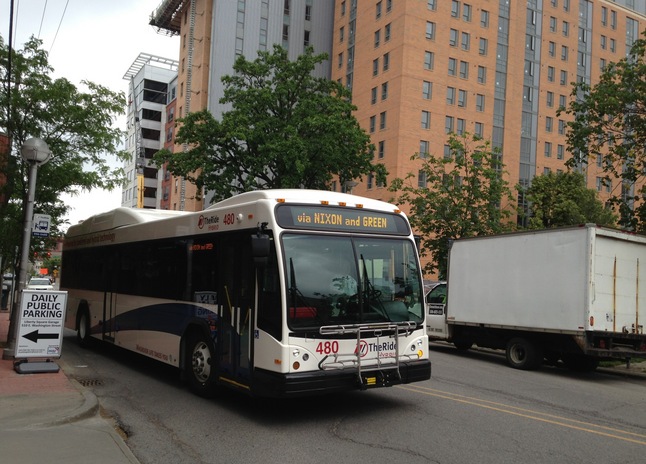
An Ann Arbor Transportation Authority bus headed out to Plymouth Road on Route 2A pulls away from a stop on Washington Street in downtown Ann Arbor after picking up a passenger on Friday afternoon. In the background is the new Varsity student high-rise that's nearly complete.
Ryan J. Stanton | AnnArbor.com
Council Members Mike Anglin, D-5th Ward, and Sabra Briere, D-1st Ward, said there's talk of putting a millage on the ballot to pay for increased bus services through the Ann Arbor Transportation Authority now that Ypsilanti is joining the AATA and expanding the authority's footprint.
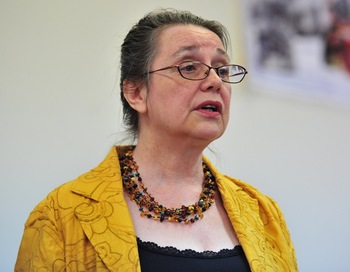
Sabra Briere
Ryan J. Stanton | AnnArbor.com
Briere said she expects serious discussions in the coming months about the possibility of an AATA millage going on the November ballot in both Ann Arbor and Ypsilanti. She said she hasn't heard yet how much it could be.
"That's the next step we'll face," Briere said, adding a new millage could provide decent transportation options within Washtenaw County's urban core — a goal of both cities.
"There will be a cost associated with expanding services into Ypsilanti," she said. "There's also a cost associated with adding services in Ann Arbor."
Ann Arbor residents already pay about 2 mills and Ypsilanti residents pay about 1 mill for AATA services. The new Ann Arbor Area Transportation Authority, which is now in the process of being formed and would include Ypsilanti and Ann Arbor, could ask voters to approve a separate transit levy on top of the millages the two cities already pay.
Ypsilanti on its own cannot increase its millage rate, Briere said, because it already has "taxed itself to the ceiling."
"It cannot tax itself any more, and if they're going to contribute more to transportation, it has to come from something other than a city millage," Briere said.
In Ypsilanti, 35.2 mills of taxes are levied by the city, compared to 16.6 mills in Ann Arbor. Ypsilanti's total homestead tax rate of 64.4 mills also beats Ann Arbor's 45.7 mills.
AATA CEO Michael Ford told AnnArbor.com on Monday a few steps remain before a millage could go to voters, but he's expecting those steps to be taken this summer.
The Ann Arbor City Council already agreed to revise the AATA's articles of incorporation to include Ypsilanti, and now the AATA board must concur with the changes.
"Once our board has taken formal action, we will then focus on getting the new board members appointed from Ann Arbor and Ypsilanti," Ford said. "We expect that the new constituted board will then take a look at what funding is needed to improve services in the expanded authority area."
Once there is agreement with the new board on how to move forward, Ford said, then officials will have a better idea about whether or when a millage will be brought to the voters.
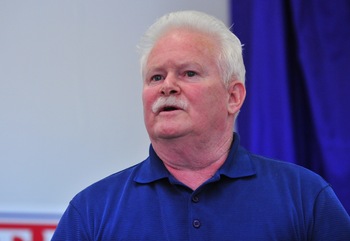
Mike Anglin
Ryan J. Stanton | AnnArbor.com
If there are other interested municipalities wanting to join the authority, Ford said, they could request and seek consideration to join the newly expanded authority.
Anglin, a major critic of some of Ann Arbor's other transportation initiatives — including the push for a new Amtrak station — said expanded bus service is something he could get behind.
"I'm very, very good with the buses," he said. "I'll vote for the millage for the buses because I think we have colleges out there, we have populations we can start moving back and forth."
He added, "I will not vote for the train — possibly in my lifetime — in this area. We just don't have the population density needed to support a train."
Anglin and Briere are running unopposed in the Democratic primary in August, but they could face challengers in November if any Independent candidates file to run.
Kirk Westphal, chairman of the city's Planning Commission, also is running unopposed in the Democratic primary, but he's expected to face 2nd Ward incumbent Jane Lumm in November.
Lumm, an Independent, was in attendance on Saturday but did not participate in the candidate forum, which was hosted by the Ann Arbor Democratic Party.
Council Member Stephen Kunselman, D-3rd Ward, shared the stage with his primary opponent, Julie Grand, chairwoman of the city's Park Advisory Commission.
Also on stage was Jack Eaton, a neighborhood activist who is trying to unseat Council Member Marcia Higgins, D-4th Ward, in the August primary. Higgins was sick and did not attend.
Westphal made known he's a strong supporter of transit and the environment, and he supports transit initiatives that Lumm has questioned. He said he and his wife moved to Ann Arbor from New York in 2004 and actually bought their house here because it was on a bus line.
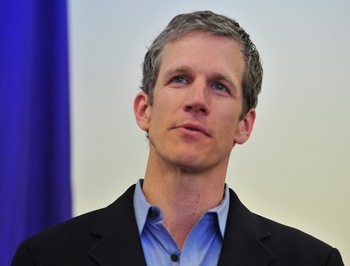
Kirk Westphal
Ryan J. Stanton | AnnArbor.com
He said transit doesn't work sustainably without density, so that's an element that must be rolled into the conversation.
"The service has to be robust enough to attract people out of their cars, but then again we need to support development near transit lines in order to make it a sustainable, financial endeavor."
Anglin made it clear he's a big supporter of buses, but not a supporter of trains. He said buses are the most economical way to move people around a city the size of Ann Arbor and they're flexible.
"They're much less expensive than trains," he said. "If you think you can afford a train here, you're going to be really surprised how much that costs and the subsidies that are attached."
Anglin said the city shouldn't "start entering into realms" it doesn't know much about, because "we'll get burned financially very, very badly." He said too much money has gone into pondering the possibility of a new Amtrak train station on Fuller Road.
"We go down roads spending a lot of money, and we can't do the essentials," he said. "The city's job is to do the essentials — have your police and fire, have your services here in your town, plant some more trees, keep your roads looking really good, and then when you can achieve these things, then look beyond. I'm not saying don't have a vision."
Eaton said transit is a regional question, but he questioned the recent process the AATA went through for creating a countywide transit authority — a plan that ultimately fell apart when not enough neighboring municipalities expressed interest in funding the proposed services.
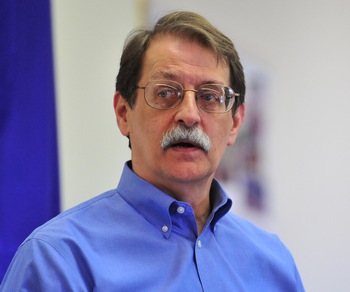
Jack Eaton
Ryan J. Stanton | AnnArbor.com
"So I would be careful with the money we collect for our local transit system and I would focus on improving what we have to show how well it works for us — make it an attraction to live inside of Ann Arbor and demonstrate to other communities that it's worthwhile."
Eaton said he would support increasing the frequency of buses within the city limits and the duration of hours so that buses run later in the evening, and he'd support more investment in roads.
"We need to improve our infrastructure so that the pavement is good enough to ride a bicycle on," he said. "The potholes and the horrible surfaces that drivers complain about are even worse for bicyclists and pedestrians. We need to improve the markings on our roads and our bike lanes so that it's clearly maintained so that a bicyclist feels secure in their bike lane."
Briere acknowledged there are different opinions in the community about how public transit should work.
"Some of us think it should be our substitute for owning a car — we should be able to go to the doctor, go to the grocery, go to the library, without having to own a car," she said.
That would mean a lot of neighborhood service, she said, while other people think the public transit system should be the means for people commuting to work.
"I don't think we have consensus on those two viewpoints yet," she said.
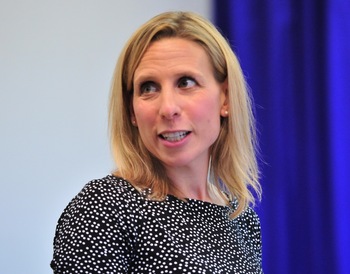
Julie Grand
Ryan J. Stanton | AnnArbor.com
"I heard a complaint just last week that somebody couldn't go to an event because there was no parking available downtown," she said. "I hear all the time people don't want to go downtown because the parking is so difficult."
She said she also hears other people say Ann Arbor doesn't need more parking downtown.
"So the fact that we have these very different, polarized decisions and opinions about transportation shows that this is not a simple problem," she said.
Kunselman used the forum as an opportunity to make clear he's going to do whatever it takes to prevent a new train station on Fuller Road.
"Fuller Road Station took too much time in terms of our transportation discussion, and we need to actually kill it," he said. "And I will be proposing, if I win the Democratic primary in August, to rescind the memorandum of understanding that put Fuller Road Station on the table."
With Fuller Road off the table, Kunselman said, the city could focus more on talking about park-and-ride lots, vanpools, the Border-to-Border Trail, the AirRide buses out to the airport, sidewalks and bike lanes. He also mentioned the possibility of a new train station using part of the MichCon property across the tracks from the existing Amtrak station on Depot Street.
He said the property directly across from the station already is owned by Amtrak and the MichCon site could include both parking and parkland.
Grand said the city only has so much control over the decisions that are made around transit, but she talked about what she sees as possibilities.
"We need to diversify our transit options," she said. "The park-and-ride system has been very successful for a lot of people. I would like to see more of that."
She said she knows the idea of a new Amtrak train station in Ann Arbor is a hot-button issue, but she's glad it's on the city's radar and is going to be decided by voters eventually.
"So ultimately my opinion doesn't even matter that much about the train, but I'm glad that it's being studied," she said.
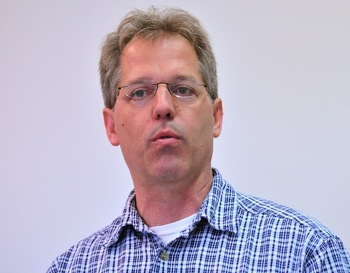
Stephen Kunselman
Ryan J. Stanton | AnnArbor.com
"That is all about making nonmotorized connections," she said. "And I believe if you want people on their bikes you get them using their bikes in a recreational setting. And then it becomes more feasible to that person to then think about other kinds of nonmotorized or alternative transportation."
Kunselman said he thinks Eli Cooper, the city's transportation program manager, could do a better job focusing on a more refined transportation agenda.
"He can't do that job because he was appointed to the AATA and serves as the policy advisor to the mayor, and where did that go?" Kunselman said. "Countywide transit — that flopped. That failed because it didn't have the people behind it. It was a classic example of poker politics, and we need to remove that city staff person from the AATA who doesn't live in the city — doesn't have an egg in the nest, so to speak — and get him back focused on our transportation planning."
Ryan J. Stanton covers government and politics for AnnArbor.com. Reach him at ryanstanton@annarbor.com or 734-623-2529. You also can follow him on Twitter or subscribe to AnnArbor.com's email newsletters.